Related Research Articles
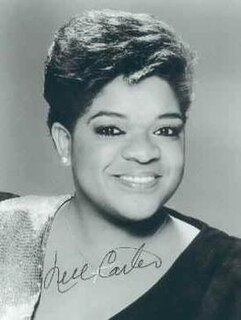
Nell Carter was an American singer and actress.

Harold Smith Prince, commonly known as Hal Prince, was an American theatrical director and producer known for his work in musical theater.

Jeannette Theresa Dubois, known professionally as Ja'Net DuBois, Ja'net DuBois, and Ja'Net Du Bois, was an American actress and singer. She was best known for her portrayal of Willona Woods, the neighborhood gossip maven and a friend of the Evans family on the CBS sitcom Good Times, which originally aired from 1974 to 1979.
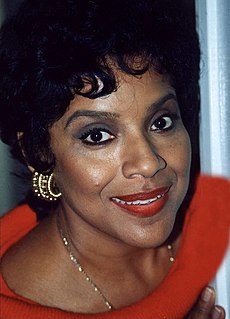
Phylicia Rashād is an American actress, singer and stage director. She is known for her role as Clair Huxtable on the NBC sitcom The Cosby Show (1984–1992) which earned her Emmy Award nominations in 1985 and 1986. She was dubbed "The Mother Of The Black Community" at the 2010 NAACP Image Awards and played Ruth Lucas on Cosby (1996–2000).

Ellsworth Raymond "Bumpy" Johnson was an American crime boss in the Harlem neighborhood of New York City.

Judyann Elder is an American actress, director, and writer. Elder played Nadine Waters on the FOX sitcom Martin. She also played Harriette Winslow on CBS' Family Matters for the remaining eight episodes of its ninth and final season after the departure of Jo Marie Payton. Elder is also a veteran of the stage who has appeared in scores of theatrical productions throughout the United States and Europe.

Rosetta LeNoire was an American stage, movie, and television actress as well as a Broadway producer and casting agent. LeNoire is known to contemporary audiences for her work in television. She had regular roles on the series Gimme a Break! and Amen, and is best known for her role as Estelle "Mother" Winslow on Family Matters, which ran from 1989 to 1998. In 1999, she was awarded the National Medal of Arts.
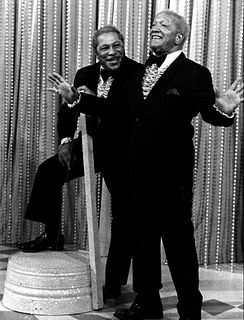
Donald Thomas Bexley was an American actor and comedian, best known for playing Bubba Bexley on the 1970s television sitcom Sanford and Son.

Robert Hooks is an American actor, producer, and activist. He is most recognizable to the public for his more than 100 roles in films, television, and stage. Most famously, Hooks, along with Douglas Turner Ward and Gerald S. Krone, founded The Negro Ensemble Company. The Negro Ensemble Company is credited with the launch of the careers of many major black artists of all disciplines, while creating a body of performance literature over the last thirty years, providing the backbone of African-American theatrical classics. Additionally, Hooks is the sole founder of two significant black theatre companies: the D.C. Black Repertory Company, and New York's Group Theatre Workshop.
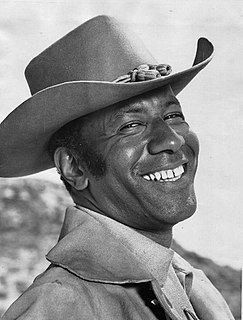
Raymond St. Jacques was an American actor, director and producer whose career spanned over thirty years on stage, film and television. St. Jacques is noted as the first African American actor to appear in a regular role on a western series, portraying Simon Blake on the eighth season of Rawhide (1965–1966).

Cotton Comes to Harlem is a 1970 American neo-noir action comedy thriller film co-written and directed by Ossie Davis and starring Godfrey Cambridge, Raymond St. Jacques, and Redd Foxx. The film is based on Chester Himes' novel of the same name. The opening theme, "Ain't Now But It's Gonna Be," was written by Ossie Davis and performed by Melba Moore. The film was one of the many black films that appeared in the 1970s and became an overnight hit. It was followed two years later by the sequel Come Back, Charleston Blue.

Kenny Leon is an American director, producer, actor, and author, notable for his work on Broadway, on television, and in regional theater. In 2014, he won the Tony Award for Best Director of a Play for A Raisin in the Sun.
Philip Rose was a Broadway theatrical producer of such productions as A Raisin in the Sun, The Owl and the Pussycat, Does a Tiger Wear a Necktie?, Purlie, and Shenandoah. His work was particularly notable for its social insight and distinctive social conscience.

Diana Patricia Sands was an American actress, perhaps most known for her portrayal of Beneatha Younger, the sister of Sidney Poitier's character in the original stage and film versions of Lorraine Hansberry's A Raisin in the Sun (1961).

Stewart F. Lane is a Broadway producer, director, playwright and former actor. He has also written books, including Let's Put on a Show! and Jews of Broadway. He has also produced in Dublin. In addition to publishing two plays, he has directed across the country, working with Stephen Baldwin, Shannen Doherty, Chazz Palminteri, and more. He is co-owner of the Palace Theatre (Broadway) with the Nederlander Organization and a partner in the Tribeca Grill with Robert De Niro, Sean Penn and Mikhail Baryshnikov. He has written three books: Let's Put on a Show!, Jews on Broadway: An Historical Survey of Performers, Playwrights, Composers, Lyricists and Producers, and Black Broadway: African Americans on the Great White Way.
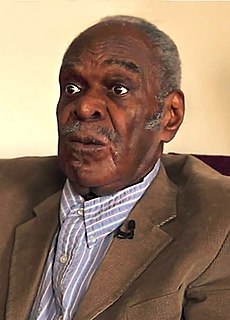
Douglas Turner Ward was an American playwright, actor, director, and theatrical producer. He was noted for being a founder and artistic director of the Negro Ensemble Company (NEC). He was nominated for the Tony Award for Best Featured Actor in a Play in 1974 for his role in The River Niger, which he also directed.
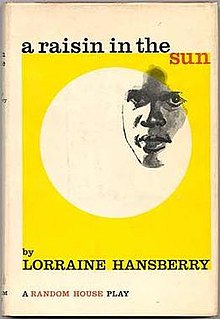
A Raisin in the Sun is a play by Lorraine Hansberry that debuted on Broadway in 1959. The title comes from the poem "Harlem" by Langston Hughes. The story tells of a Black family's experiences in south Chicago, as they attempt to improve their financial circumstances with an insurance payout following the death of the father, and deals with matters of housing discrimination, racism, and assimilation. The New York Drama Critics' Circle named it the best play of 1959, and in recent years publications such as The Independent and Time Out have listed it among the best plays ever written.
Dick Campbell, born Cornelius Coleridge Campbell, was a key figure in black theater during the Harlem Renaissance. While a successful performer in his own right, Campbell is best known as a tireless advocate for black actors in general. As a theater producer and director, he helped launch the careers of several black theater artists, including Ossie Davis, Frederick O'Neal, Loften Mitchell, Helen Martin, and Abram Hill.
David Downing was an American stage, film, and television actor. He was one of the original members of the Negro Ensemble Company in New York City.
Sheila Wills is an American actress, also known as Sheila DeWindt. She is known for her regular role on the television series B.J. and the Bear, and recurring roles on series including Days of Our Lives, Battlestar Galactica, and Generations.
References
- 1 2 3 4 5 6 7 8 9 10 11 Mel Gussow (June 22, 1997). "Hal DeWindt, 63, a Producer And an Advocate for Integration". The New York Times . Retrieved January 4, 2017.
- 1 2 3 4 5 "Hal DeWindt, Acclaimed Director-Producer-Actor, Dies". Jet . Johnson Publishing Company. July 14, 1997. p. 65. Retrieved January 4, 2017.
- 1 2 3 Doug Galloway (June 19, 1997). "Hal DeWindt". Variety . Retrieved January 4, 2017.
- ↑ "Ghost Player". Jet. Johnson Publishing Company. April 19, 1962. p. 62. Retrieved January 4, 2017.
- 1 2 David Lefkowitz (June 24, 1997). "Inner City Rep's Hal DeWindt, 63, Dies In L.A." Playbill . Retrieved January 4, 2017.
- ↑ "Critics Offer Harsh Reviews For DeWindt's Play". Jet. Johnson Publishing Company. July 19, 1962. Retrieved January 4, 2017.
- 1 2 3 Anthony D. Hill; Douglas Q. Barnett (December 4, 2008). Historical Dictionary of African American Theater. Scarecrow Press. pp. 18, 140. ISBN 9780810862760 . Retrieved January 4, 2017.
- ↑ Margalit Fox (August 3, 2011). "Bubba Smith, N.F.L. Star and Actor, Dies at 66". The New York Times. Retrieved January 4, 2017.
- ↑ Bubba Smith; Hal DeWindt (1983). Kill, Bubba, Kill!. Simon & Schuster. ISBN 9780671476472 . Retrieved January 4, 2017.
- ↑ "This Week's Census". Jet. Johnson Publishing Company. November 13, 1958. p. 46. Retrieved January 4, 2017.
- ↑ "Sheila De Windt: BJ And Bear Star Says Beauty Can Be A Handicap". Jet . August 6, 1981. p. 54. Retrieved January 4, 2017.
- ↑ Sylvia P. Flanagan (October 21, 1985). "Sheila DeWindt Combines Successful Career With Motherhood". Jet. p. 57. Retrieved January 4, 2017.
- ↑ Gerri Major (April 9, 1984). "Society World". Jet. Retrieved January 4, 2017.